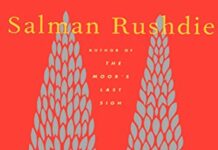
Ebook Info
- Published: 2010
- Number of pages: 450 pages
- Format: EPUB
- File Size: 2.10 MB
- Authors: Salman Rushdie
Description
In his first novel since The Satanic Verses, Rushdie gives readers a masterpiece of controlled storytelling, informed by astonishing scope and ambition, by turns compassionate, wicked, poignant, and funny. From the paradise of Aurora’s legendary salon to his omnipotent father’s sky-garden atop a towering glass high-rise, the Moor’s story evokes his family’s often grotesque but compulsively moving fortunes in a world of possibilities embodied by India in this century.
User’s Reviews
Reviews from Amazon users which were colected at the time this book was published on the website:
⭐“The Moor’s Last Sigh” tells the tale of three generations of an Indian family that built its fortune in the spice trade. This isn’t the type of book that would usually float to the top of my stack. I read it because I was traveling to Kochi (Cochin), and it came recommended because much of the first part of the book is set there. (The same recommendation might be received by someone traveling to Mumbai because the latter half of the book is set in that city; granted, there are a lot more stories set in Mumbai [Bombay] than Kochi.) Ultimately, I was pleasantly surprised by this book, despite its soap opera like tone.The book does read like a soap opera, at least until it gets into the narrating character’s story. There are strong women characters in this male-dominated environment of an Indian family business, though they tend to fall into the categories of “petty bitch” or “prima donna” or both. In the first generation there is a matriarchal character who dominates the family by manipulation and cruelty. In the second generation, the female lead—a strong-spirited, independent artist—falls in love with a Jewish employee of the family. Those familiar with marriage as practiced by the Indian elite will recognize how this inter-sect wedding with an underling might result in no small grief. The resulting marriage produces two female children and a boy. The latter would be nothing but a source of bliss, but for a birth defect that results in a malformed arm. While his mother smothers him with love and attempts to display a progressive spirit that’s beyond biases against such infirmities, under the surface there is the need to come to grips with the fact that handicapped children aren’t supposed to happen in high-caste families. The man with the infirmity is the narrator and overall protagonist of the book. He—as seems inevitable—will eventually fall for a woman of which his mother does not approve.Beyond the soap opera pettiness, there are genuine intrigues that unfold in the latter half of the book. However, the pettiness of narcissistic people is the root of the protagonist’s ultimate trial.While Rushdie builds characters in the manner we expect of literary fiction, he doesn’t abandon story. There is a narrative arc that unfolds over the course of the novel. Surprises are revealed and twists unfold.This is the first Rushdie novel I’ve read. I’ve always intended to read “The Satanic Verses” to see what all the hullaballoo was about, and the readability of this work makes me even more interested in following through. You know a writer has to be good to inspire a country to take out a hit on him.I’d recommend this for more than just people visiting Kochi or Mumbai—though it will be particularly interesting for those who are. If you’re interested in the lifestyles of the rich and famous in India more generally, you’ll find this work enlightening. In general, it will appeal to those who like their literary fiction with a bit of a storyline—and if you like the low drama of bitchiness, all the more so.
⭐Countless times I attempted reading Salman Rushdie’s “The Moor’s Last Sigh.” Every borrowed library edition was returned unfinished after being distracted long enough to necessitate re-reading from the beginning and long enough to incur fines for lateness. After being assigned the controversial “Satanic Verses” for a college course on Post-colonial literature I had anticipated the satisfaction of reading other novels by Rushdie during semester break. It never happened, after a promising start with memorable sensual prose and witty word play my interest would wane every time Aurora Da Gama fell in love with Abraham Zogoiby and they consummated their desire on a shelf covered with bags of spices. Invariably there was a subtle shift in tone that caused me to drift from the book, disappointed with myself for abandoning it again. After a degree of success with finishing dense prose on kindle (I finally made it to the end of Jean Genet’s “Our Lady of the Flowers” because the weight of holding the book no longer distracted from the gravity of the words) so I invested in a digital copy of the novel.It was a chore to finally finish the novel. Other reviews assert that the narrative trajectory of “the Moor’s Last Sigh” ceases once the protagonist is born, the anecdotes about his elders are well constructed and engaging. Feuding families and acerbic artists intersect in an alternative history of the sub-continent with enough magical realism and eccentricity to propel the story forward. Many memorable details, mentioned when I debate the merits of the novel by a friend who defends its brilliance, only happen within the initial third of the novel. The image of Aires removing his clothing while his new bride waits with nervous anticipation in bed for their nuptials, donning the wedding gown and veil to flee the bridal suite into the waiting boat of his male lover, is a stunning invention. However, nothing of equivalent resonance happens once “Moor” Moraes is born. The foreshadowing of his expulsion from the “Edenic” paradise of his mother’s salon of artists and intellectuals builds to a ridiculous justification for being disowned. His shrewdly calculating lover tape records their lovemaking sessions and encourages him to express maternal resentment mid-coitus. Cast out of his family she encourages a suicidal pact that backfires when she drinks the wrong poisoned potion and actually dies. Incarcerated and abandoned by his affluent family Moraes has no other recourse than to embrace the underbelly of Bombay. Admittedly the retelling of the tale inspires a sense of wonderment, but such an interesting plot was told in meandering tangents that derail the trajectory. By the time Moraes arrives at Benengeli and Vasco Miranda’s “mad fortress” I prayed for a swift conclusion, fully aware that the novel was ending where it began. Rushdie is a wildly inventive writer, but like his friend and colleague Angela Carter, the style initially sustains interest before wearying the reader with incessant smug cleverness and every ending is rushed at the moment when the author abandoned their own interest in the novel they were writing. At least Salman Rushdie had “The Satanic Verses” and Angela Carter’s ode to Shakespeare through an illegitimate twin vaudevillian dance act whose father was a respectable Shakespearean actor (“Wise Children”) ended her writing career on a high note (before her unfortunate passing).
⭐I read and loved this book years ago. Since retirement and covid has given me time, I am mixing my old faves in with the new. This is a marvel. And I don’t plan to wait for another pandemic to read it again. Pepper Love For Ever
⭐Rushdie is clearly brilliant, and The Moor’s Last Sigh is the work of a genius. I freely admit to having missed a substantial portion of the book; it simply went over my head. I enjoyed the talent of the writer and the thousands of clever connections and tricks of the book. Nevertheless, I found myself absolutely unable to develop true fondness for any of the characters; I really cared very little what happened to them. Most of the time, this included the protagonist, though occasionally I did feel sympathy or slight affection for him. Finally, I found the plot a bit weak. There were one to many twists thrown in until I found myself asking what, exactly, is the point of this whole book?
⭐A typical Salman Rushdie constant change of time, dramatic personae and geographical location. One has to have a good memoryand a long time span in order to follow the various strands of the story. A most gorgeous narrative spanning time and space.A wonderful, unique author who allows one to savor history, society and humanity in all its aspects.
⭐I have slowly been working my way through Rushdie novels and the book provided an interesting, though rather strange story. The book had its challenging moments but I am happy enough to have read it. The characters were quite intereting though the main character was strangest of all. I wouldn’t reread it but will keep working though his novels.
⭐Rushdie has an amazing English style . . . witty enough to make you think twice. This book is a hilariously funny account of growing up, which does feature Mumbai as a main character . . . and a complex plot behind how everyone got to Mumbai, a kind of comic epic. . . So, you laugh and laugh, and then you get to the end and it is painful and there is this kind of bitter aftertaste . . . In other words, the moral content of the narrative is presented in a way which makes you laugh and then makes you start to wonder how you missed the undertones . . . how does the wit and verve of the story-telling make us blind to some rather less pleasant things? Is this an example of how we can construct our own personal life-narratives to delude ourselves? . . . and other such serious philosophical questions . . . How does the “exoticism” of the tale take us outside of ourselves so that we can turn around and see what we have been blind to in ourselves? I am, at the moment, very intrigued by the construction of moral/practical arguments . . . and this book gives much sensuous pleasure in the process . . .
⭐I read this again after two years and remembered almost nothing of it while reading again and trying this time to follow it better and concentrate more. I don’t regret it! It probably needs reading another time to be rally enjoyed to the full. I fine the metaphors and allusions very difficult to understand.
⭐This was bought for someone else.
⭐Quick delivery, well packaged.
⭐I hadn’t read this before, although have read ‘Shame’ several times and love it. This again, is a wonderfully addictive book. You are drawn inexorably into the world he creates. If you have been to India, you will know that this isn’t ‘Magical realism’, it’s India’s reality.
Keywords
Free Download The Moor’s Last Sigh in EPUB format
The Moor’s Last Sigh EPUB Free Download
Download The Moor’s Last Sigh 2010 EPUB Free
The Moor’s Last Sigh 2010 EPUB Free Download
Download The Moor’s Last Sigh EPUB
Free Download Ebook The Moor’s Last Sigh





